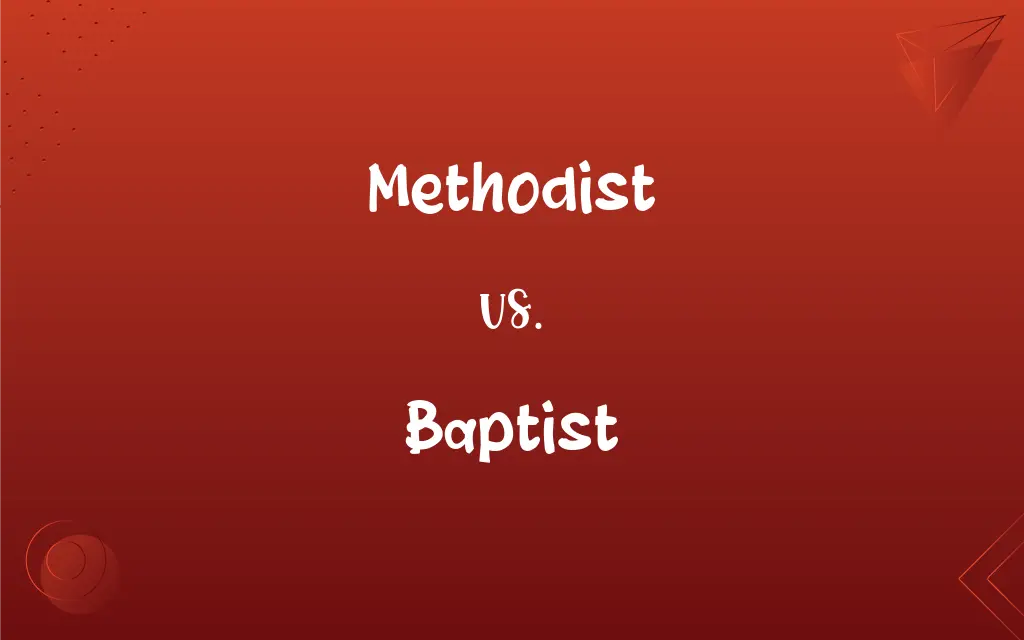Methodist vs. Baptist: What's the Difference?
Edited by Janet White || By Harlon Moss || Updated on October 3, 2023
Methodists and Baptists are Christian denominations with distinct beliefs and practices; primarily, Baptists emphasize adult baptism, whereas Methodists baptize all ages.

Key Differences
The Methodist denomination aligns with Arminian theology, embracing free will in accepting God's salvation. Methodists perform baptisms on individuals of all ages, including infants, as a sign of God’s grace. On the other hand, Baptist traditions primarily follow Calvinist theology with a key belief in predestination. Baptists prioritize believer’s baptism, asserting that individuals should be of an accountable age to accept and understand the significance of baptism.
Methodists usually follow a more structured, hierarchical form of church governance, involving bishops in administrative processes and spiritual leadership. Bishops in the Methodist tradition are not viewed as having ascended to a higher clerical order but serve administrative and leadership functions. Contrarily, Baptist churches often adhere to a congregational governance model. Baptists emphasize local church autonomy where each congregation independently governs its affairs and does not submit to a higher ecclesiastical authority.
In general, Methodist worship services might be characterized by a formal and liturgical style, often following a set pattern or order of worship. Methodists may engage in corporate confession and utilize creeds in their worship gatherings, expressing a collective faith. Baptist worship tends to lean toward the informal and may vary widely with no strict liturgical adherence. Baptists often emphasize individual confession and might not incorporate creeds as centrally in worship, focusing on scripture and personal belief.
Methodists often display a more liberal approach toward social issues and might be more inclusive in various aspects like ordaining women and LGBTQ+ clergy. Some Methodist congregations actively advocate for social justice and may be more permissive on issues like same-sex marriage. Baptist congregations, conversely, may often adopt a conservative stance on social and theological issues. Issues such as LGBTQ+ rights and women in pastoral leadership can be viewed restrictively within many Baptist churches.
Methodist and Baptist churches both observe the sacrament of Communion but may understand and practice it distinctly. Methodists generally practice open communion, welcoming all believers to participate, viewing it as a means of grace through which participants might experience a deeper faith and repentance. Baptists commonly practice closed or close communion, where participants should be baptized believers, and in some cases, members of a Baptist church, affirming a shared belief and commitment through the act.
ADVERTISEMENT
Comparison Chart
Theology
Arminian (Free Will)
Calvinist (Predestination)
Baptism Age
All ages, including infants
Believers (older children/adults)
Governance
Hierarchical (Uses Bishops)
Congregational
Approach to Social Issues
Often more liberal and inclusive
Typically more conservative
Communion
Open (all believers invited)
Closed/Close (baptized believers/members)
ADVERTISEMENT
Methodist and Baptist Definitions
Methodist
A Member of Methodism.
The Methodist visited various congregations to understand diverse worship styles.
Baptist
Believer in Adult Baptism.
The Baptist upheld believer's baptism as a testimony of faith.
Methodist
Participant in Structured Governance.
The Methodist respected the administrative roles of bishops in the church.
Baptist
Practitioner of Closed Communion.
The Baptist participated in communion with fellow baptized believers in the church.
Methodist
Adherent of Holiness.
The Methodist pursued holiness through faith and good works.
Baptist
Member of a Baptist Church.
The Baptist valued the autonomy of his local congregation.
Methodist
A Worshiper in a Methodist Church.
The Methodist appreciated the liturgical worship style.
Baptist
Advocate for Congregationalism.
The Baptist participated actively in congregational decisions and elections.
Methodist
A Supporter of Wesleyan Theology.
The Methodist often referred to John Wesley's sermons for theological insight.
Baptist
Proponent of Calvinist Theology.
The Baptist explored doctrines of grace within his theological framework.
Methodist
Methodist One who emphasizes or insists on systematic procedure.
Baptist
Baptist One that baptizes.
Methodist
One who follows a method.
Baptist
A member of an evangelical Protestant church of congregational polity, following the Reformed tradition in worship and believing in freedom of conscience, separation of church and state, and baptism only of voluntary, conscious believers.
Methodist
A member of an evangelical Protestant church founded on the principles of John and Charles Wesley in England in the early 1700s and characterized by active concern with social welfare and public morals.
Baptist
A person who baptizes.
Methodist
(history of science) One who limits the domain of science to that which can be investigated using the scientific method.
Baptist
One who administers baptism; - specifically applied to John, the forerunner of Christ.
Methodist
Alternative form of Methodist.
Baptist
One of a denomination of Christians who deny the validity of infant baptism and of sprinkling, and maintain that baptism should be administered to believers alone, and should be by immersion. See Anabaptist.
Methodist
One who observes method.
Baptist
Follower of Baptistic doctrines
Methodist
One of an ancient school of physicians who rejected observation and founded their practice on reasoning and theory.
Baptist
Of or pertaining to or characteristic of the Baptist church;
Baptist baptismal practices
A Baptist minister
Methodist
One of a sect of Christians, the outgrowth of a small association called the "Holy Club," formed at Oxford University, a. d. 1729, of which the most conspicuous members were John Wesley and his brother Charles Wesley; - originally so called from the methodical strictness of members of the club in all religious duties.
Methodist
A person of strict piety; one who lives in the exact observance of religious duties; - sometimes so called in contempt or ridicule.
Methodist
Of or pertaining to the sect of Methodists; as, Methodist hymns; a Methodist elder.
Methodist
A follower of Wesleyanism as practiced by the Methodist Church
Methodist
Of or pertaining to or characteristic of the branch of Protestantism adhering to the views of Wesley;
Methodist theology
FAQs
How do Baptists view women in pastoral leadership?
Views among Baptists vary; some Baptist denominations ordain women, while others reserve pastoral roles specifically for men.
Do Baptists utilize creeds in their worship and theology?
Baptists might reference creeds but generally emphasize the supremacy of Scripture and individual conviction over creedal statements.
How are Methodist churches globally connected?
Methodist churches might be part of larger global and regional bodies, sharing certain theological and administrative ties.
What is the foundational theology of Methodists?
Methodists generally adhere to Arminian theology which emphasizes free will in salvation and sanctification.
How do Baptists typically view the concept of predestination?
Baptists, especially those of a Reformed tradition, may adhere to Calvinist theology, emphasizing predestination in salvation.
Who leads the governance in the Methodist church?
Methodists often utilize a hierarchical governance structure, involving bishops in both administrative and spiritual leadership roles.
Are Methodists generally liberal or conservative in their social views?
Methodists may often exhibit a more liberal stance towards social issues and inclusivity, though this can vary between congregations.
Who is permitted to partake in Communion in Baptist churches?
Baptists often practice closed or close communion, restricting participation to baptized believers, and sometimes, only church members.
Can women hold pastoral roles in Methodist churches?
Yes, many Methodist denominations ordain women and allow them to hold pastoral and leadership positions.
How do Baptists approach contemporary social issues?
Baptists might commonly uphold conservative views on social and theological issues, though there is diversity among Baptist churches.
Are Methodists creedal in their theology and worship?
Methodists might utilize creeds in worship and view them as valuable in expressing shared beliefs, without seeing them as infallible.
Are Baptist churches globally interconnected?
While there are associations and conventions, Baptist churches emphasize local autonomy and may not be administratively connected globally.
How significant are small groups within Baptist church life?
Baptists often value small groups for discipleship and community, providing a space for deeper study, prayer, and fellowship beyond Sunday worship.
What is the Baptist perspective on the appropriate age for baptism?
Baptists advocate for believer's baptism, meaning individuals are baptized when they are old enough to consciously profess faith in Christ.
How do Methodists practice the sacrament of Communion?
Methodists generally practice open communion, inviting all believers to participate, and perceive it as a means of grace.
Is the worship style in Methodist churches formal or informal?
Methodist worship is often more formal and liturgical, though there is a spectrum of worship styles across various congregations.
What role do small groups play in Methodist churches?
Small groups are often vital in Methodist churches for spiritual growth, discipleship, and community, reflecting John Wesley’s emphasis on “class meetings”.
How do Baptist churches manage their administrative decisions?
Baptists typically adopt a congregational model, where each local church maintains autonomy in governance and decision-making.
How do Methodists approach the sacrament of baptism?
Methodists perform baptisms on individuals of all ages, viewing it as a sign and means of God’s grace, not strictly tied to profession of faith.
What characterizes the worship style in Baptist churches?
Baptist worship can be varied but often leans towards being informal and may not adhere to a strict liturgical structure.
About Author
Written by
Harlon MossHarlon is a seasoned quality moderator and accomplished content writer for Difference Wiki. An alumnus of the prestigious University of California, he earned his degree in Computer Science. Leveraging his academic background, Harlon brings a meticulous and informed perspective to his work, ensuring content accuracy and excellence.
Edited by
Janet WhiteJanet White has been an esteemed writer and blogger for Difference Wiki. Holding a Master's degree in Science and Medical Journalism from the prestigious Boston University, she has consistently demonstrated her expertise and passion for her field. When she's not immersed in her work, Janet relishes her time exercising, delving into a good book, and cherishing moments with friends and family.






























































